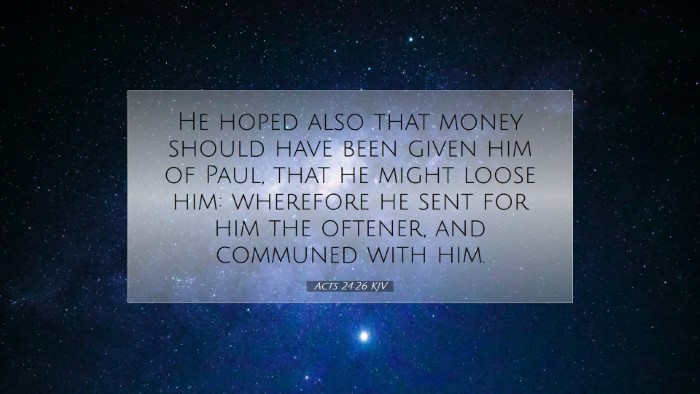Old Testament
Genesis Exodus Leviticus Numbers Deuteronomy Joshua Judges Ruth 1 Samuel 2 Samuel 1 Kings 2 Kings 1 Chronicles 2 Chronicles Ezra Nehemiah Esther Job Psalms Proverbs Ecclesiastes Song of Solomon Isaiah Jeremiah Lamentations Ezekiel Daniel Hosea Joel Amos Obadiah Jonah Micah Nahum Habakkuk Zephaniah Haggai Zechariah MalachiActs 24:26
Acts 24:26 KJV
He hoped also that money should have been given him of Paul, that he might loose him: wherefore he sent for him the oftener, and communed with him.
Acts 24:26 Bible Commentary
Commentary on Acts 24:26
Acts 24:26 states: "He hoped also that money should have been given him of Paul, that he might loose him: wherefore he sent for him the oftener, and communed with him."
Exegesis and Contextual Analysis
This passage occurs during Paul's imprisonment in Caesarea, where he is brought before the Roman governor Felix. The narrative within Acts provides insight into the early church's struggles and the political climate of the time. Understanding Felix's motives and actions is crucial in this context.
- Historical Background: Felix was a freedman who had risen through political ranks, known for his cruelty and corruption. His governance illustrates the tension between Roman authority and early Christian preaching.
- Acts’ Theological Themes: The early chapters of Acts emphasize the apostles' commitment to the gospel amidst persecution and the role of the Holy Spirit in guiding believers.
- Paul’s Situation: Paul’s imprisonment and his defense before various rulers underscore the conflict between the church and civil powers.
Commentary Insights
Matthew Henry: Henry notes that Felix was interested in the potential for monetary gain arising from Paul’s situation. He reflected on the corrupt nature of human desires where spiritual matters are often interwoven with greed. Felix’s repeated meetings with Paul were motivated not by a sincere desire for truth but by his hope for a bribe. Henry emphasizes that God’s providence governs such interactions, positioning Paul in a unique way to share the gospel, even in chains.
Albert Barnes: Barnes focuses on the implications of Felix’s actions, arguing that they reveal human nature’s propensity towards corruption. His expectation that Paul might offer money for release speaks to the broader societal issues of justice. Furthermore, Barnes suggests that Felix's indecision and manipulation represent the difficulties that those faithful to the gospel might face. The passage serves as a reminder that true freedom and justice do not always align with worldly standards.
Adam Clarke: Clarke delves into the psychology of Felix, suggesting that he was aware of Paul’s innocence yet chose to ignore it for personal gain. He highlights how this passage serves not only as a historical account but also as a reflection on human motives. Clarke illustrates the stark contrast between Paul’s integrity and Felix’s moral ambiguity, framing Paul’s witness as a powerful testimony to the integrity of the Christian faith amidst corruption.
Theological Reflections
This verse offers rich theological implications about the nature of faith, righteousness, and justice.
- Divine Providence: The ongoing dialogue between Paul and Felix indicates God’s hand at work, using even the darkest situations for His glory and purpose.
- Nature of True Justice: Felix represents the flawed justice systems often present in worldly governance, contrasting with God's perfect justice.
- Integrity in Adversity: Paul's steadfastness in the faith, even in the face of greed and corruption, serves as a model for believers today.
Applications for Today’s Believers
The narrative surrounding Acts 24:26 provides crucial lessons for contemporary Christians:
- Ethics in Leadership: Both secular and religious leaders must be held to ethical standards; this passage challenges the faithful to pray for and advocate for integrity in leadership.
- Witness in Trials: Believers are often placed in circumstances that test their faith; they should take these moments to bear witness to God’s truth, as Paul did.
- Confronting Materialism: The temptation to align faith with the pursuit of material gain, as seen with Felix, should serve as a warning for Christians today.
Conclusion
Acts 24:26 serves not only as a historical account of Paul’s interactions with Felix but also as a profound commentary on human nature, the integrity of faith, and the ethics of leadership. It challenges believers to reflect on their responses to adversity and to remain steadfast in their commitment to God’s truth amid corruption and temptation. Through this lens, the passage continues to resonate with pastors, students, theologians, and Bible scholars, prompting deep reflections on justice, motive, and the overarching sovereignty of God in all circumstances.


